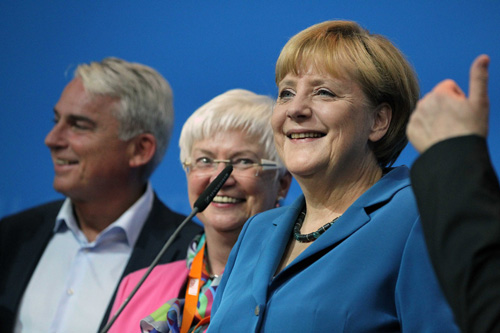|
 |
|
VICTORY: German Chancellor Angela Merkel (first right) is applauded at her Christian Democratic Union's headquarters in Berlin after the first exit polls showed the party won the federal election on September 22 (LUO HUANHUAN) |

German Chancellor Angela Merkel's Christian Democratic Union and its sister party, the Christian Social Union of Bavaria, won a historic 41.5 percent of the vote in the federal election on September 22. If Merkel forms a ruling coalition with her rival parties and successfully serves out a third four-year term as chancellor, she would eclipse Margaret Thatcher as Europe's longest serving elected female head of government.
Personal charisma
It is not easy for politicians to stay at the pinnacle of power for long in the crisis-ridden European political arena. In recent years, the heads of several European powers including Italy, France and Spain were replaced due to their poor performance in responding to the debt crisis. But meanwhile, Merkel has won fame and unprecedented support for her effective crisis management. In the last seven years, the German iron lady has ranked at the top of the prestigious list of the world's most powerful women by Forbes magazine six times.
Merkel's success is largely due to her personality as well as her ruling style. Despite a comparative late start in the political game, her modesty and diligence helped Merkel become a mature politician quickly.
Before her first term as German chancellor in 2005, Merkel served several posts both in her party and the German cabinet successively, during which time she became knowledgeable on many topics through firsthand experience. Since the outbreak of the European debt crisis in 2009, Merkel has intensively studied economics and fast become an expert on matters relating to the crisis.
A balanced and reasonable governing style has gained Merkel public trust and support. She doesn't make decision rashly or present views without deliberation. She is a good listener, and stands firmly behind her decisions.
Merkel is also a typical pragmatist. For instance, the German Government had planned to shut down the country's nuclear power stations by 2035, but a majority of German citizens called for abandoning nuclear energy even sooner following the meltdown of Japan's Fukushima Daiichi Nuclear Power Plant in the wake of the disastrous March 2011 earthquake and tsunami. In response, Merkel made a timely compromise to close all nuclear power stations in Germany by 2022.
In the latest election campaign, Merkel's recognition of some policies advocated by the rival Social Democratic Party and Green Party helped her expand her support base.
Economic success
Merkel's popularity also lies in her handling of the German economy.
In her first term, the German Government launched two massive economic stimulus packages totaling 82 billion euros ($111 billion), most of which went to the country's real economy as well as vocational training and consumption subsidy, effectively improving the country's competitiveness. She also pushed the implementation of a 500-billion-euro ($676 billion) financial rescue package to stabilize the bank system and restore market confidence. In the meantime, Merkel attached great importance to steady job creation. By promoting a flexible work system and implementing a strict employee layoff system, Germany has kept a stable job market.
After the eurozone became mired in the debt crisis, Germany launched an austerity program totaling 80 billion euros ($108 billion), the biggest since World War II. Merkel's administration has made great efforts to straighten out financial affairs and cut financial deficits and public debt. In 2012, Germany ended its deficit with a surplus of 4.2 billion euros ($5.68 billion).
In addition, complying with the aspirations of the people, Merkel actively promotes Germany's transformation to clean energy sources, placing the country at the forefront in this respect internationally. Led by Merkel, the German Government has also increased support to small and medium-sized enterprises (SMEs) and the middle class, making German society more sustainable.
With the steady growth of its economy, Germany is playing a bigger role in the EU. In effect, almost all efforts of the bloc to cope with the debt crisis would have amounted to empty talks without Germany's agreement.
In the past three years' struggle with the crisis, Merkel has stuck firmly to the basic principle that all debtor nations should implement strict austerity measures and conduct structural reforms. As such, only when they reach certain standards will the EU and Germany bail them out. In the process, Merkel opposed any kind of debt mutualization and objected firmly to pay the bill for those debt-ridden countries that do not practice financial discipline.
Though the firm stance of Germany has drawn antipathy from South European countries, it is undeniable that the German solution is an effective way out of the current predicament. So far, led by Germany, the EU has made it through the worst of the crisis, though the situation remains fragile.
| 